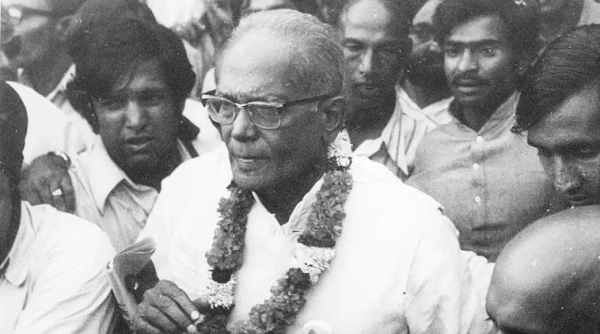Death Anniversary of Jaiprakash Narayan | 09 Oct 2025
Why in News?
On 8th October 2025, the Vice-President of India, C. P. Radhakrishnan, paid floral tributes to Jaiprakash Narayan at Samvidhan Sadan on the occasion of his death anniversary.
Key Points
- About: Jayaprakash Narayan was born on 11th October 1902 in Sitabdiara, Bihar, to Phool Rani Devi and Harshu Dayal, and married Prabhabati, the daughter of lawyer and Congress leader Braja Kishore Prasad, in 1920.
- Education: J.P. studied at Patna Collegiate School and later joined Patna College, but left due to British funding and enrolled in Bihar Vidyapith, a non-cooperation institution.
- From 1922 to 1929, he pursued higher studies in the U.S. at multiple universities, focusing on Sociology and influenced by Marxist-Leninist ideas, particularly those of M.N. Roy.
- Return to India: Upon returning to India in 1929, he joined the Indian National Congress (INC) and participated in the Lahore session, where the resolution for Complete Independence (Poorna Swaraj) was passed. Despite his Marxist beliefs, he admired Gandhiji’s leadership.
- Involvement in the Civil Disobedience Movement: Jayaprakash joined the Civil Disobedience Movement and organised an underground office. He was arrested in September 1932 and imprisoned in Nasik Central Jail, where he met future prominent leaders and further strengthened his socialist ideals.
- Formation of the Congress Socialist Party (CSP): In Nasik Jail, Jayaprakash and others formed the Congress Socialist Party (CSP) to infuse socialist ideals into the freedom movement, advocating for mass struggle over electoral participation.
- Quit India Movement and Arrests: During the Quit India Movement in 1942, Jayaprakash escaped from Hazaribagh Central Jail and formed the “Azad Dasta” in Nepal to fight British rule. He was re-arrested in 1943, endured harsh treatment, and was released in 1946 due to widespread public pressure, earning the title "The Heart of Indians."
- Post-Independence Contributions: After India gained independence, Jayaprakash joined the Sarvodaya Movement, led by Vinoba Bhave. He donated his land for the Bhoodan Movement and advocated for social reforms in rural India.
- Sampurna Kranti and Political Legacy: In the 1970s, he led the call for "Sampurna Kranti" (Total Revolution) to address corruption and democratic decay.
- His efforts led to the formation of the Janata Party in 1977, which ousted Indira Gandhi from power. He passed away on 8th October 1979, leaving a lasting impact on India’s political landscape.

